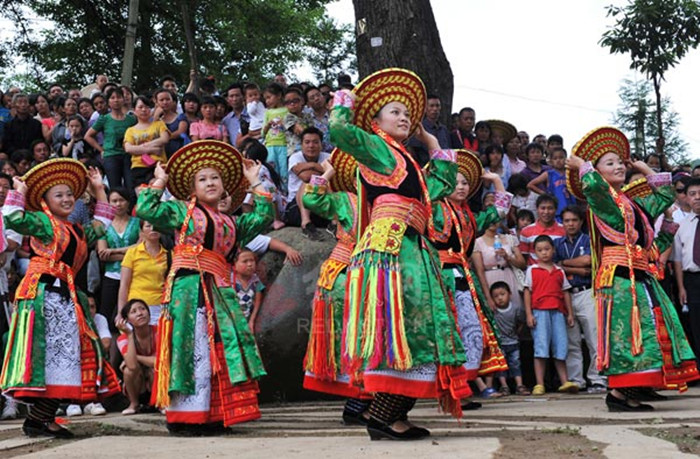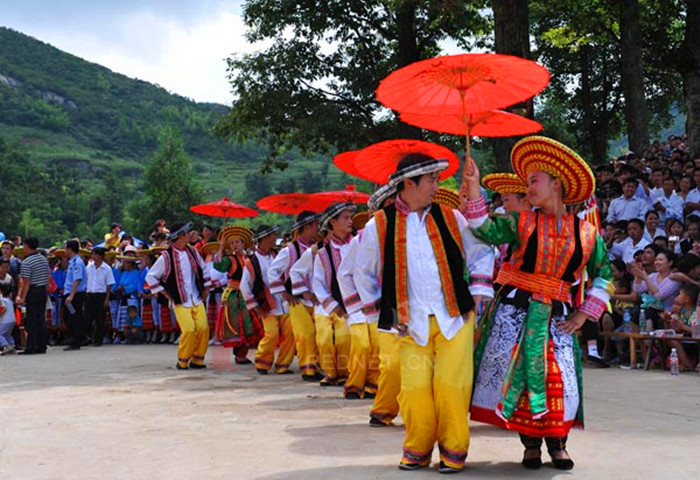Longhui Huayao Pepole’s Traditional Festival---“Taoliaogui”
Source:Artistic CollectionWriter:ZhangYu ShenLijuan PTime:2014-09-29Clicks:次
On July 29, the grand joint performances of “Joyful Hunan, Happy Yao Land” were held at Yao Nationality Township on the Tiger-shaped Mountain in Longhui County. Tens of hundreds of Yao and Han people watched the performances, which marked the start of the celebration of Huayao people’s traditional festival “Taoliaogui”.

The festival “Taoliaogui” falls on August 1 to 3, which presents the traditional culture of the local people in Xiaoshajiang Town and Yao Nationality Township of Longhui. It is also a significant gathering of Yao and Han people. The festival lasts three days, which will attract, in addition to the locals, hundreds of thousands of visitors and businessmen from neighboring counties like Xupu, Dongkou, Xinhua and even admirers from other districts and provinces. The festival with another name “Ganmiao” given by Han people instead of “Taoliaogui” also means a three-day fair where people sell and buy things and entertain themselves. For the three days the town will be the busiest in a year crowded by people, including pretty young Yao girls and women who, because of being fond of beauty, will wear their beautiful national costumes with wonderful decorates. Bright colorful flowers can be seen on them from head to foot, which is a striking mark of Huayao (Flower Yao) people different from other nationalities.
“Taoliaogui” can date back to the times a thousand years ago. It is the pronunciation of Yao speech, with “tao” meaning “pass”, “liao” meaning “curse” and “gui” meaning “Bodhisattva”. The whole expression means “pass the Bodhisattva’s curse”. Han people’s “ganmiao” means “get rid of Miao savages”. It shows Han people’s racial discrimination over Miao nationality, so it a taboo among Miao people. Now “ganmiao” has changed the original meaning for a new one, that is, “going to Miao fair”. Along with “Taoliaogui” there is a similar festival named “Taonianbai”, with“Tao” meaning “hold”, “nian meaning “bloody” and “bai” meaning “memorial ceremony”. As a whole the expression means “hold a bloody memorial ceremony”. Both are connected with terrible war and bloody slaughter. Therefore the two festivals were initially meant to memorize war. Yao people’s ancestors hated war and slaughter because in ancient times they were driven out of their homeland and were even chased and killed during the course of fleeing.

Yao people have no written language but they have their own oral speech called Yao speech. Only from their oral speech can we discover their history. For example, there is a sentence in a Yao folk song, that is, “Baoguitangbaobeidoubeikabie”. “Baogui” is a flower god, “baobei” is a flower goddess, “tang” means “marry”. The sentence means that the flower god married the flower goddess and then had off-springs. There is a song “...crossing the river and the sea...”, which says that the ancestors of Huayao nationality went with the purpose of escaping war from the Yellow River down southward to Fujian and Zhejiang Provinces. They then continued their escape to Jiangxi Province and settled at Tianlu of Ji’an prefecture. Due to constant wars, they started migration again to Guangdong, Guangxi, Yunan,and Guizhou provinces. Finally they arrived in Hunan and settled down scattering around Hongjiang in the Xuefeng Mountains. After settlement they set “taonianbai” and “taoliaogui” in memory of the bloody days of being chased and killed.
In Yao national history there appeared many outstanding people, among whom were heroes of turbulent days such as Shen Dangli, Bu Yatong and Yang Yake, and Feng Yun and Pu Qianxi who are recorded in history books as leaders of peasants uprisings. Each clan chooses certain days when misfortune fell upon it to hold a memorial ceremony for its ancient martyrs and forefathers. If the days are in the first half year the ceremony is called “taonianbai”; if in the second half year, it is called “taoliaogui”. For example, May15,16 and 17 are for Feng family clan, whose celebrating spot is at Shuidongping, July 2, 3 and 4 for Liu family clan whose memorizing place used to be at Datuo and then moved to Mao’ao, and July 8, 9 and 10 for Shen family clan whose celebrating scene was first at Xiaoshajiang and now is at Chongmudang. Therefore, each family clan has its own “taonianbai” and “taoliaogui” festivals. As time went by, many such festivals for certain family clans died out.

At such festivals, Huayao people have the custom of not eating cucumber or bottle gourd. Generally, the people do not plant the two vegetables, for they are worshiped as spirits. A historical story explains the reason. Long, long ago, a young couple of man and woman hid themselves in a shed of thickly growing cucumber and bottle gourd to avoid being killed after a fierce battle. They succeeded. Ever since the two plants are admired and worshiped as Huayao people’s protective gods generation after generation.
After liberation, the two festivals became activity days for the union of different nationalities, during which Yao and Han people celebrate the days together by singing and dancing happily. They are good occasions for trade, on which people from different provinces of the country come gathering on Huayao land to do business while enjoying the primitive beautiful natural scenery and Huayao people’s lifestyle. They are also wonderful occasions when young men and women sing songs in couple to express their love for each other, from which point they go hand in hand to the palace of marriage.

Whenever any of the two festivals takes place, Yao and Han people will put on grand folk performances: folk song singing, love song singing, bird-gun firing, national dances, cross-stitch skill displays, Meishan master hunting skill shows, and so on. Visitors from all parts of the country are so much attracted that they are not willing to leave.
(translated by Yi Daoqin)

The festival “Taoliaogui” falls on August 1 to 3, which presents the traditional culture of the local people in Xiaoshajiang Town and Yao Nationality Township of Longhui. It is also a significant gathering of Yao and Han people. The festival lasts three days, which will attract, in addition to the locals, hundreds of thousands of visitors and businessmen from neighboring counties like Xupu, Dongkou, Xinhua and even admirers from other districts and provinces. The festival with another name “Ganmiao” given by Han people instead of “Taoliaogui” also means a three-day fair where people sell and buy things and entertain themselves. For the three days the town will be the busiest in a year crowded by people, including pretty young Yao girls and women who, because of being fond of beauty, will wear their beautiful national costumes with wonderful decorates. Bright colorful flowers can be seen on them from head to foot, which is a striking mark of Huayao (Flower Yao) people different from other nationalities.
“Taoliaogui” can date back to the times a thousand years ago. It is the pronunciation of Yao speech, with “tao” meaning “pass”, “liao” meaning “curse” and “gui” meaning “Bodhisattva”. The whole expression means “pass the Bodhisattva’s curse”. Han people’s “ganmiao” means “get rid of Miao savages”. It shows Han people’s racial discrimination over Miao nationality, so it a taboo among Miao people. Now “ganmiao” has changed the original meaning for a new one, that is, “going to Miao fair”. Along with “Taoliaogui” there is a similar festival named “Taonianbai”, with“Tao” meaning “hold”, “nian meaning “bloody” and “bai” meaning “memorial ceremony”. As a whole the expression means “hold a bloody memorial ceremony”. Both are connected with terrible war and bloody slaughter. Therefore the two festivals were initially meant to memorize war. Yao people’s ancestors hated war and slaughter because in ancient times they were driven out of their homeland and were even chased and killed during the course of fleeing.

Yao people have no written language but they have their own oral speech called Yao speech. Only from their oral speech can we discover their history. For example, there is a sentence in a Yao folk song, that is, “Baoguitangbaobeidoubeikabie”. “Baogui” is a flower god, “baobei” is a flower goddess, “tang” means “marry”. The sentence means that the flower god married the flower goddess and then had off-springs. There is a song “...crossing the river and the sea...”, which says that the ancestors of Huayao nationality went with the purpose of escaping war from the Yellow River down southward to Fujian and Zhejiang Provinces. They then continued their escape to Jiangxi Province and settled at Tianlu of Ji’an prefecture. Due to constant wars, they started migration again to Guangdong, Guangxi, Yunan,and Guizhou provinces. Finally they arrived in Hunan and settled down scattering around Hongjiang in the Xuefeng Mountains. After settlement they set “taonianbai” and “taoliaogui” in memory of the bloody days of being chased and killed.
In Yao national history there appeared many outstanding people, among whom were heroes of turbulent days such as Shen Dangli, Bu Yatong and Yang Yake, and Feng Yun and Pu Qianxi who are recorded in history books as leaders of peasants uprisings. Each clan chooses certain days when misfortune fell upon it to hold a memorial ceremony for its ancient martyrs and forefathers. If the days are in the first half year the ceremony is called “taonianbai”; if in the second half year, it is called “taoliaogui”. For example, May15,16 and 17 are for Feng family clan, whose celebrating spot is at Shuidongping, July 2, 3 and 4 for Liu family clan whose memorizing place used to be at Datuo and then moved to Mao’ao, and July 8, 9 and 10 for Shen family clan whose celebrating scene was first at Xiaoshajiang and now is at Chongmudang. Therefore, each family clan has its own “taonianbai” and “taoliaogui” festivals. As time went by, many such festivals for certain family clans died out.

At such festivals, Huayao people have the custom of not eating cucumber or bottle gourd. Generally, the people do not plant the two vegetables, for they are worshiped as spirits. A historical story explains the reason. Long, long ago, a young couple of man and woman hid themselves in a shed of thickly growing cucumber and bottle gourd to avoid being killed after a fierce battle. They succeeded. Ever since the two plants are admired and worshiped as Huayao people’s protective gods generation after generation.
After liberation, the two festivals became activity days for the union of different nationalities, during which Yao and Han people celebrate the days together by singing and dancing happily. They are good occasions for trade, on which people from different provinces of the country come gathering on Huayao land to do business while enjoying the primitive beautiful natural scenery and Huayao people’s lifestyle. They are also wonderful occasions when young men and women sing songs in couple to express their love for each other, from which point they go hand in hand to the palace of marriage.

Whenever any of the two festivals takes place, Yao and Han people will put on grand folk performances: folk song singing, love song singing, bird-gun firing, national dances, cross-stitch skill displays, Meishan master hunting skill shows, and so on. Visitors from all parts of the country are so much attracted that they are not willing to leave.
(translated by Yi Daoqin)
